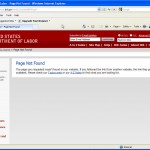labor rights
Just two weeks ago, families of the 29 men who were killed on April 5, 2010 at Massey Energy's Upper Big Branch (UBB) mine traveled to Washington DC to urge lawmakers to improve our nation's mine safety law. The West Virginia natives met with Republican and Democratic Members of Congress and asked for four simple reforms targeted at the mining industry's bad actors. They weren't asking anything for themselves. Only for new laws to help deter unscrupulous employers from causing another disaster and causing other communities to suffer the same pain and loss the UBB…
by Kim Krisberg
When most of us think of sustainability and construction, the usual suspects probably come to mind: efficient cooling and heating, using nontoxic building materials, minimizing environmental degradation — in other words, being green. But in Austin, Texas, a new effort is working to expand the definition of sustainability from the buildings themselves to the hands that put them together.
Launched about a year ago, the Workers Defense Project's Premier Community Builders program certifies major new developments as sustainable for workers. That means making sure construction…
by Beth Spence
Carrying enlarged photographs of their lost loved ones, family members of three of the 29 miners killed in the 2010 explosion at West Virginia’s Upper Big Branch mine spent June 6-7 in Washington, D.C., pleading with lawmakers to take action to improve mine safety and to stiffen penalties for mining companies that knowingly, willingly and recklessly place miners’ lives at risk.
Senator Joe Manchin (D-WV) stands with Clay Mullins, Betty Harrah, Gary Quarles and AFSC staff member Beth Spence. Photo by Bryan Vana, American Friends Service Committee.
Betty Harrah’s photo showed…
by Mark Catlin
Tony Mazzocchi was a visionary who was in the forefront of the labor movement's major struggles for social justice in the postwar period. Those hard fought struggles and victories, from the civil rights movement and the struggles against nuclear proliferation and the Vietnam War, to the struggle for environmental justice and the movement for occupational health and safety, which he spearheaded.
Last evening, in a very moving ceremony, the US Department of Labor inducted Tony Mazzocchi, dynamic labor leader, into its Labor Hall of Honor. The ceremony took place at…
The Obama Administration's quest to appease business interests' claims about burdensome and outdated regulations awoke a giant in the form of the civil rights, public health and workers' safety communities. From the Southern Poverty Law Center and the National Council of LaRaza, to the American Public Health Association and Nebraska Appleseed, the feedback is loud and clear: USDA should withdraw the regulatory changes it proposed in January (77 Fed Reg 4408) which would shift the responsibility for examining and sorting poultry carcasses with obvious defects from USDA inspectors to the…
Members of and organizations affiliated with the National Council of La Raza (NCLR) received an Action Alert today urging them to tell USDA Secretary Tom Vilsack to withdraw his agency's proposed rule on poultry slaughter inspection (77 Fed Reg 4408.) As written here previously and by the Center for Progressive Reform's Rena Steinzor in "The Age of Greed," the USDA proposal was developed in response to President Obama's edict about regulations, and his call to agencies to eliminate "outmoded" and "excessively burdensome" rules. The change proposed by USDA involves shifting the responsibility…
This time last week, many of us in the public health and workers' rights community were still in shock by the Obama Administration's decision to withdraw its proposed regulation to protect children who work on farms. Others weren't really surprised and simply chalked it up to the Administration caving into energetic attacks by the American Farm Bureau, Republicans in Congress (and some Democrats, too) and anti-regulation spinmaster radio hosts. The proposal recommended that children aged 15 years and younger---who are being paid as employees----be prohibited from doing some of the MOST…
Earlier this week, Lizzie Grossman reported here at The Pump Handle on revisions to OSHA's Hazard Communication standard which align the agency's 30 year old rule with a globally harmonized system for classifying and labeling chemical hazards. In "Moving from Right-to-Know to Right-to-Understand," we learn how the changes stem from a 2002 United Nations resolution and why they should help U.S. workers better protect themselves from chemical hazards in their workplaces.
I spent some time this week reading for myself the 858-page document, and by the time I got to page 20 it was clear that…
by Elizabeth Grossman
His job, the Metalworkers Alliance of the Philippines union leader told us, was assembling the electronics - the wire- or cable-harnesses - that go into cars. The work involved soldering, using flux, along with epoxies, and various degreasers or solvents. He and his co-workers didn't know the actual names of the substances they were working with or what was in those products. They also didn't know if it was a coincidence, but two co-workers had become seriously ill and the union leader and other co-workers had begun to worry that these diseases might have been caused by…
I was saddened to read that Congressman Donald Payne (D-NJ) died yesterday from colon cancer. Just a month ago, the 77-year old Member of Congress announced he was undergoing treatment for the disease. An estimated 51,700 individuals in the U.S. will die this year from cancers of the colon and rectum.
"I am heartbroken to learn of Congressman Payne's passing," said Congressman George Miller (D-CA) in a statement. The two served together for several years on the House Education and the Workforce Committee. Miller's statement continues:
"Donald served his constituents and this nation…
Federal OSHA proposed a $283,000 penalty against an employer responsible for staffing a Hershey's chocolate packaging facilty in Palmyra, Pennsylvania for willfully violating workplace safety regulations. The agency's action followed a formal complaint lodged by workers at the plant, many of whom were foreign students employed under the State Department's J-1 visa program. A few hundred of them walked off the job last summer to protest the poor working conditions in the Hershey plant. The New York Times' Julie Preston reported at the time about workers' injuries related to heavy lifting,…
The topics for my blog posts sometimes come from unusual places. This post is one of these. It popped in my head as I watched Natalie Portman announce the nominees for best actor during Sunday night's Academy Award broadcast. The snippet featuring Demián Bichir in "A Better Life" reminded me of a worker-fatality report that I bookmarked a few weeks ago, but never got around to reading. Like Bichir's character Carlos Galindo, I recall the report's abstract mentioned a day laborer who might have worked as a gardener.
I opened the bookmark yesterday to the report released in January 2012 by…
Agricultural exceptionalism is a term used to describe the special status awarded to employers and firms involved in agriculture. Proponents argue that the special status is necessary because (1) agricultural products contribute to broad national goals (e.g., providing safe and affordable food, preventing hunger); and (2) farming is inherently risky because of the uncertainty of weather and pests.
This exceptionalism allows employers, for example, to provide lesser protection and benefits to their workers compared to what is given to workers employed in non-agriculture industries.…
The worker-led organization Restaurant Opportunities Center United released this month a new type of diners' guide, one that focuses on working conditions for the employees at 180 restaurants nationwide. The US restaurant industry employs 10 million individuals and is the fastest growing sector in the economy. More than half of restaurant workers, however, earn less than the federal poverty line and very, very few (an estimated 10%) are offered paid sick leave. [Achoo!! from the waitress. Sniffle, sniffle, cough, cough from the cook.]
The 30-page Consumer Guide on the Working Conditions of…
For U.S. workers, the risk of dying on the job is highest if you are employed in agricultural, fishing or hunting. These jobs are not just a little riskier than the average job, they are nearly 8 times more life-threatening. The fatality rate for all private sector workers is 3.5 per 100,000 workers; in agriculture, fishing and hunting, the rate is 26.8 deaths per 100,000 workers. Combine these statistics with age-specific fatality rates and it was time for the US Department of Labor (DOL) to review the adequacy of its safety regulations for children working in farming jobs. The rules…
Congressman Denny Rehberg (R-MT) and his Republican members of the House Appropriations subcommittee with jurisdiction over the Labor Department don't think coal miner deserve better protection from black lung disease. In their FY 2012 appopriations bill they would prohibit the Mine Safety and Health Administration (MSHA) from using any funds to develop, promulgate, enforce or otherwise implement a new rule to protect miners from exposure respirable coal dust. (See page 36 in the bill.) This is a rule that has been in the works since at least 1996 when a federal advisory committee made…
At a recent congressional hearing called "Workforce challenges facing the agricultural industry," one Minnesota employer explained why he relies on "guest workers" to fill his seasonal jobs:
"...few Americans who are seriously seeking work will apply for, accept, and remain in seasonal and intermittent employment, especially in the agricultural sector. Many who are hired do not last long as they find the work too physically demanding or repetitive, are not willing to work in unfavorable weather conditions, or find the work schedule too demanding."
Under the U.S. Labor Department's H-2A…


